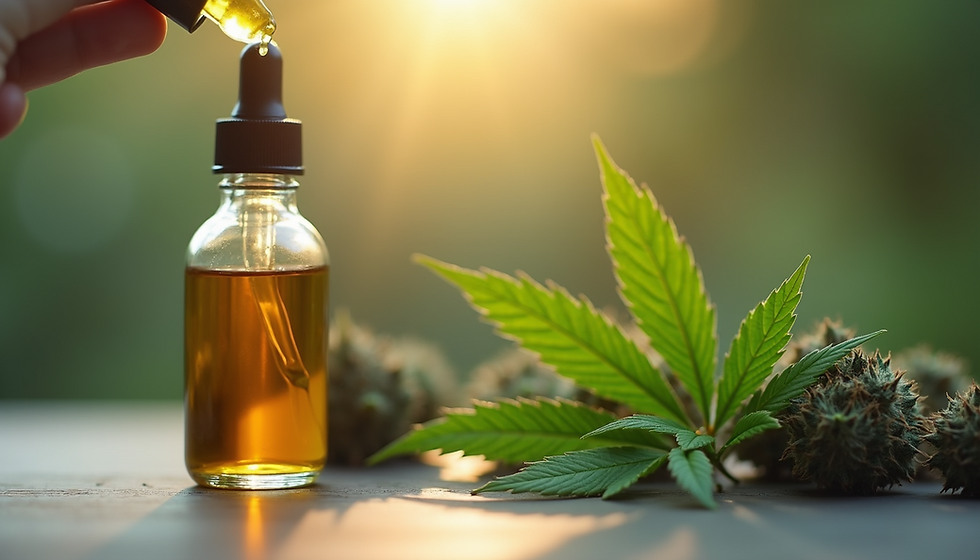The Impact of Cannabis on Athlete Recovery, Inflammation Management, and Performance Enhancement
- cannawannafl
- Aug 17, 2025
- 3 min read
Athletes are always looking for ways to boost their performance, recover faster, and manage the pain that comes with training and competing. In recent years, cannabis has gained significant attention as a potential tool for these purposes. This blog post explores how cannabis affects athlete recovery, its role in managing inflammation, and its possible effects on performance enhancement.
Understanding Cannabis
Cannabis is a plant that contains more than 100 different compounds called cannabinoids, with tetrahydrocannabinol (THC) and cannabidiol (CBD) being the most recognized. THC is known for its psychoactive effects, while CBD is valued for its therapeutic qualities, including pain relief and anxiety reduction. As attitudes toward cannabis shift, many athletes are looking at it as a viable option for recovery and enhanced performance.
Recovery and Cannabis
Recovery is critical for any athlete. It allows the body to heal and recuperate from intense physical activity, which helps prevent injuries and prepares athletes for their next challenge. Many athletes are now considering cannabis, especially CBD, to boost their recovery process.
Research indicates that CBD may have powerful anti-inflammatory effects, which can help reduce muscle soreness after workouts. For example, a study in the Journal of Pain Research revealed that CBD application led to significant reductions in pain and inflammation in animal models. This provides a strong basis for further studies on how CBD may help human athletes recover more effectively.
Furthermore, athletes often face sleep issues due to the physical and psychological demands of their training. Inadequate rest can hinder recovery and performance. CBD has shown promise in improving sleep quality and minimizing anxiety, making it a potential asset for athletes who struggle with restful sleep. A study found that 66% of participants reported improved sleep after using CBD, illustrating its potential to aid recovery.
Inflammation Management
Inflammation is the body's natural response to injury or stress. While it plays a vital role in healing, chronic inflammation can hurt athletic performance. Conventional anti-inflammatory medications can have unwanted side effects, often impacting an athlete's performance negatively.
Cannabis, particularly CBD, may serve as an alternative for managing inflammation. It interacts with the endocannabinoid system, which regulates pain, inflammation, and immune responses. By influencing these processes, CBD may offer a safer method to control inflammation without the side effects linked to traditional medications.
Promising research shows that cannabinoids might reduce the release of inflammatory markers in the body. For instance, one study demonstrated a 40% decrease in inflammation markers in subjects treated with CBD. This can be a game changer for athletes dealing with chronic pain and inflammation resulting from intense training or injuries.
Performance Enhancement
While recovery and inflammation management are crucial, many athletes are keen to explore performance enhancement. The effects of cannabis on performance can vary significantly among individuals.
For some athletes, particularly in precision sports requiring focus, CBD may help improve concentration, reduce anxiety, and streamline mental processes during competition. Some users report enhanced clarity and calmness, making it easier to perform under pressure. Anecdotal evidence suggests that after using CBD, athletes experienced a 20% improvement in concentration during crucial moments in their competitions.
On the flip side, THC's psychoactive properties can have mixed effects on athletic performance. Some athletes might find that THC impairs their coordination and reaction time, potentially hindering their performance in sports that require precision. This makes it vital for athletes to understand the cannabinoid composition of any cannabis product they consider.
Additionally, legality is a significant factor. Although regulations around cannabis are changing, athletes must stay informed about the World Anti-Doping Agency (WADA) guidelines to avoid unintentional violations. As of 2023, THC is still prohibited in-competition in many sports, emphasizing the importance of thorough knowledge and consideration.
Exploring New Horizons
As the sports world evolves, so does the potential of cannabis as a recovery aid, inflammation management tool, and performance enhancer. It's important for athletes to weigh the specifics of their sport, their personal responses to cannabinoids, and the legal implications involved.
As research continues, we will gain a clearer understanding of how cannabis can support athlete recovery and performance. Just like any supplement or treatment, athletes should consult health professionals to find the best strategies for their individual health and performance needs.
With ongoing research, cannabis may carve out a more defined role in the athletic community, offering innovative avenues for recovery and performance. For those athletes looking for alternatives, cannabis could indeed become a valuable addition to their training toolkit.




Comments